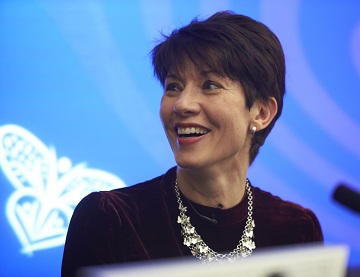Talita Ferreira of Authentic Change Solutions on the importance of authenticity in the workplace
- 9 Min Read
Talita Ferreira, founder and CEO of Authentic Change Solutions Limited and former CFO of BMW, lays out the biggest challenges and opportunities currently facing HR, and the importance of authenticity in the workplace.
- Author: HRD Connect
- Date published: Dec 20, 2016
- Categories

Talita Ferreira, founder and CEO of Authentic Change Solutions Limited and former CFO of BMW, lays out the  biggest challenges and opportunities currently facing HR, and talks about the importance of authenticity in the workplace.
biggest challenges and opportunities currently facing HR, and talks about the importance of authenticity in the workplace.
She explains the beneficial effect that authenticity can have on organisational change and employee wellbeing, and why a move to a more authentic culture needs to come from the top.
Ferreira was speaking to HRD Connect ahead of her session at HRD Summit 2017.
In your opinion, what is the biggest challenge and opportunity currently facing the HR profession?
I think the biggest challenge is to get leaders to realise the impact we’ll have in organisations with different generations, and people living longer. You have people staying in organisations for longer, and you have Generation Y entering, who have very different views to for example Gen X, and they really feel very differently about adding value.
I think this should inspire HR to set up a platform where leaders are aware of what their real role is; their role in culture and role in leadership across the generational boundaries. This is something that I see as a real challenge; but a lot of people haven’t even realised that the challenge is coming.
What we really need is to create engagement strategies. If you just have an engagement strategy that speaks to a particular generation, you’re not going to engage everyone equally and have them fully working at the capacity where they’re adding value to the organisation and resonating with our customers.
An engagement strategy is saying, ‘What are the values that resonate with the overall company strategy, and what cultural change do I need for that? How do I get that cultural change, and get people more engaged with the organisation?’
So you could, for instance, have an engagement strategy that is about launching a new employee communication language, or a new way for employees to communicate with each other within an organisation. Something that’s really helping people to also create that feeling inside the company of being one family.
Do you think that cultural change could also be digitalisation?
I think digitalisation can play an element in it, but I don’t think that digitalisation is a cultural change, per se.
But you could use digitalisation as a means for change – for instance, you could use engagement apps, and ‘always-on’ measures where you’re asking your employees how they feel, so that you can see if there are pockets within the organisation where people aren’t empowered to carry out their role, or don’t feel like they can make a change.
I think you can use the digital world to help you to find the answers more quickly, but I don’t think digitalisation itself is really – it requires a change in mindset, of course, but from my perspective, organisational culture is more about the values and how we engage people.
What is likely to have the biggest effect on the work of your HR team – is it business strategy, or government policy?
I think there we have to talk about Brexit, and I suppose it depends on your individual organisation. If your organisation has a lot of cross-border transactions, and needs a skills base that’s coming out of Europe, at the moment you have free movement, so you’re definitely going to be very involved in what changes are being made at a governmental policy level in the next two or three years, because that could seriously impact where you get your talent from.
Leading up to Brexit, I think that’s probably what should be in our minds; on the other hand, your strategy really has to think about your customer base, where it is, and what skills and talents you need to serve that customer base, or drive your products. Government policy comes into play when you talk about things like skills levy, or other issues that are HR-affected. I can see Brexit being the biggest differentiator there in the next few years.
Where can HR make the biggest difference in your organisation?
I think HR can make the biggest difference by being a real enabler to the business; being a partner to the business, to develop those programmes that inspire leaders and create leaders of the future, and help to drive this change in culture.
What I also see is that there’s a lot of change coming from, as you say, digitalisation, and other effects; and we need to make sure that we have the right leaders who can navigate through those changes. That’s where I really see HR: both as an enabler of the business, and as a developer of people.
The leaders are driving an organisation, but if there aren’t sustainable programmes to develop them, which is where HR comes in, I think you have a real issue.
In our organisation, Authentic Change Solutions, we’re very much about change and consultancy; and for us it’s really about partnering. We don’t have an HR department, per se, but what we do is work in a different way with other people. We partner with other associates, so it’s vital that we share values and have a similar culture, and that we understand each other when we’re delivering programmes for big corporations or change programmes.
Next year, we’ll start to deliver workshops around authentic change, and it’s important that the associates I work with help to spread that message of authentic change – that we’re all aligned.
What role do you think authenticity has to play in HR and in the workplace?
I believe you get the best creativity out of people, and the most effectiveness out of people, if they can be who they authentically are. If you have people who are happy to put on ‘work masks’ every day, and come to work and not be filled with passion and enthusiasm for what they do, you’re not getting the best out of people.
That’s also again a cultural issue – whether the organisation really wants authentic individuals, or has a value of authenticity. For me, it’s also important for the wellbeing of employees, that they can be who they really are.
A company can only get people to be authentic, and to remove these masks, if they role model it from the top; if it’s part of the set of values that they want throughout the organisation, and that they publicly state are the values that they want to live by. Then the most senior leaders in the organisation have to role model that, because people look to the top.
If they don’t think that the top level really wants authenticity, and wants people to share how they feel, then employees lower down the organisation won’t be carrying it out.
Do you think authenticity can also have a beneficial effect on organisational change, with people sharing how they really feel about the company?
Definitely. I also think it makes for strong leaders – there’s been a study by Google about what it is that makes good leaders, and studies show that it’s emotional safety in a team. And emotional safety does not come from not being who you really are. People don’t resonate with leaders who aren’t truly authentic.
And I think that authenticity positively impacts the individual. If you think about the smartphone: the smartphone has integrated all our different lives into one place. It’s not so possible to keep all our lives separate any more, and if people are trying really hard to do that, I think that’s where a lot of mental stress is coming from.
Or, if they’re not working in congruence to their own true values. If people are working in an organisation whose values aren’t aligned with their own, that would exhaust them. How is it impacting that individual, to every single day come to work and pretend to be something that they’re not? That must be impacting their mental health, and their own wellbeing.
Why are so many of us afraid to make changes to our way of working?
I think it has to do with what I call the ‘state of doing’. The state of doing is something that’s driving us – it’s our fear, our limiting self-beliefs, our ego; the fact that we want to control things and we want to limit exposure. It might be because we don’t really understand what those underlying fears are, and we haven’t spent enough time to find our own self-awareness. If we did, we would understand those fears that we have.
People are fearful that they won’t look good; they’re fearful that they’ll fail, they’re fearful that they’ll lose control. And that’s exactly why they’re afraid of change.
If we want to resolve this, in an organisational context, we should spend more time understanding the human factor when we’re driving change. What we always say is, ‘That’s the strategy, this is the change that we need to get there; now let’s go do that.’ But we don’t spend a lot of time acknowledging that people are fearful of change.
For example, in the last big organisational change that I was involved in, it took me six months to realise that some of the leaders weren’t just being obstinate; they were really afraid. They were afraid that if they changed from a system of presence management, where people are just at their desks, to output management, where people can work from different places, that they would lose control.
It took me six months to find out that that was really the underlying difficulty. Now I’m running a very similar project in Germany, and this time, I’m going to take the ‘can of worms’ and open it up, and say: ‘We know you’re fearful; let’s talk about what those fears are, and see how we can manage them to make you more comfortable as leaders.’
Does HR have a responsibility to take the lead in doing something like that?
Definitely. I see HR spearheading that process with leaders in workshop-style format to get them to feel comfortable. I think HR should do this combined with the senior leaders in the organisation – set the tone from the top.
Hear more from Talita Ferreira on ‘The Authenticity Dilemma Resolved’ at HRD Summit in 2017. Her new book, The Authenticity Dilemma Resolved: Where consciousness and connectedness collide, is now available to purchase online.









